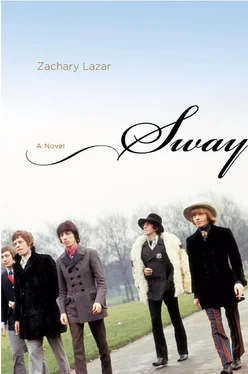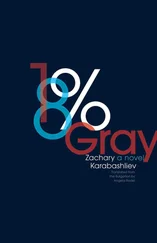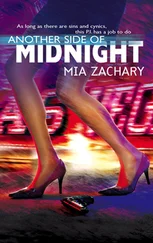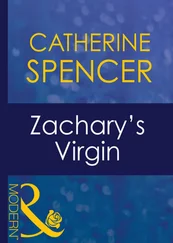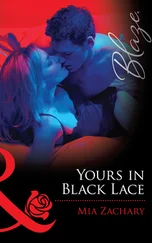It came first from the blond one, Brian, who sat cross-legged on a white disk suspended onstage in purple-tinged darkness. He was the one playing the sitar, dressed in white Indian pajamas, his facial expression switching from a studied aloofness to an embarrassingly complicit, head-nodding smile. He looked very stoned. He looked alternately glad to be a part of the band on its latest televised appearance and less convincingly intent on the music, always on the verge of breaking into laughter.
The singer, Mick, wore a green military jacket with epaulets and a brass star. It was a hint of fascism that, along with his purple mascara and silk tie, made him look uncannily like a character in one of Anger’s own films. He moved and leered like an epileptic, contorting his arms and fixing the audience with a judgmental stare. His hair was cropped short on top and longer in the back — an awkward haircut, reminiscent of prison — and when he pointed at the crowd, the glare in his eyes was like the glare of two chips of mirror.
At his side, the guitar player, Keith, was like his henchman, dressed all in black, with a black guitar, looking at his leader with open, self-conscious joy.
There was nothing about the band that wasn’t outwardly camp, but somehow they’d reversed the meaning of it all so that they looked more aggressively, even violently, straight than they would have if they were dressed in business suits. They made Anger feel oddly embarrassed for Bobby, who would never have dreamed of such a simple, compressed, and utterly sexual song.
When he got back to San Francisco, Bobby wasn’t home and the apartment was a shambles. There were bedrolls and piles of clothes in both bedrooms, even in Anger’s, where someone had left a pair of hiking boots and a suitcase and a shopping bag full of groceries. There were dirty plates left not just in the kitchen but on the floor of Bobby’s bedroom and on the sheets of his unmade bed. The Sephiroth was lying there on the floor, its pages held open by metal clips. Someone had been tracing some of its diagrams. There were sheets of these copies on the floor, some of them colored in with pencil, some of them lettered with the name of Bobby’s band. From where he stood, Anger could not read the legend beneath the diagram, but he knew what it said: “Look into the sightless Eye of the Moon and see what Light glows there. There is no Life without Death. You have been sleepwalking. Now go back to bed and dream of the Sun.”
In the kitchen, on the stove, there was a pot of ruined noodles, charred black at the center where they were stuck in a resinous clump to the aluminum surface. Everything smelled like American cheese and smoke.
He took The Sephiroth back to his bedroom and returned it to its shelf. That was when he noticed that although the other books there were neatly arrayed, they were not in their proper order. There was something particularly irritating about this, just as there was something irritating about the way someone had pushed his boots and suitcase into one corner of the room, as if this tiny effort at neatness could make the general intrusion any less offensive.
He took a more careful look at the bookshelves. It was only now that it occurred to him that something had been stolen. Why had all the books been taken down, and why had they been rearranged? Perhaps because whoever did it knew that Anger would never remember everything that was supposed to be there.
Bobby came back at around seven o’clock, carrying his guitar case. The two girls he brought with him were unusually ragged. One of them wore a lumberjack shirt over a stiff, synthetic dress. The other was freckled and auburn-haired, her eyelashes very fair, almost invisible, so that her face looked stripped or as if it had recovered from a mild burn. All three of them were so stoned that their cheeks were stiff and their eyes swollen, their gestures a parody of three people acting surprised, anticipating a greeting.
“I thought you were coming back tomorrow,” Bobby said.
Anger was bent over the kitchen trash, scraping at the pot of burnt noodles. “I came back today,” he said.
“Shit.”
“What’s been going on?”
“Shit. I thought you were coming back tomorrow. We were going to clean everything up tonight.”
Something about his stoned eyes revealed several shifting layers of falseness. They would change in an instant from rational self-assurance to befuddlement, blankness, and then become for an even briefer moment panicky, apologetic, as if they could read Anger’s suspicions, but only for an instant before they resumed their rational self-assurance.
“Here,” he said, reaching for the pot in Anger’s hands. “Let me clean that up.”
“I don’t think it’s worth either of our time, Bobby. Why don’t you go relax? We don’t have to make a ceremony out of this.”
Bobby’s eyes were simply confused now. It was as if whatever he was trying to conceal from Anger had at last been concealed from himself. He didn’t know what any of this was about anymore. He was trying to grin knowingly, to acknowledge Anger’s sarcasm, but in his eyes there was also some helpless appeal for sympathy.
They were calling them the Love Generation now: these kids who didn’t doubt themselves even when they were wrong, who would try anything, who acted as though life was an idea and not a block of time with a beginning and an end. It was impossible to disagree with them — they were what Anger believed in — but he saw that they were lost, and so a part of him wanted them to get into trouble, to find out how serious their rebellion might actually be. Later, when Bobby had disappeared, making off with his camera and almost all of the footage they had shot that year, he would wonder how he could have ever been so credulous about the Haight-Ashbury, about the whole thing of peace and flowers, about whatever he’d thought of as the opposite of thanatomania.
That evening, some more people came by in a van. The two girls were still there, as was their returned friend, the boy who had left his boots and suitcase in Anger’s bedroom. Bobby was sitting on the floor of his room, playing one of his exotic instruments, a Greek bouzouki that made a thin, percussive plinking sound. The others sat with their bare feet curled beneath them, passing around a skull-shaped pipe, inhaling its smoke with tight-lipped frowns, then turning a silent gaze on the next member of the circle. On the ceiling, a mirror ball — one more gift from Anger to his protégé — threw pinprick stars on their faces and on the frescoed walls. The girls’ bushy hair hid their foreheads and obscured their eyes. There was something darkly sexual to Anger about their hair. It hung not in tresses or curls but in hanks, as raw as the hair on their bodies.
He stepped over their circle, ignoring them, aware of himself as a stranger in his own apartment. He began rifling through some of the trunks he kept in Bobby’s closet. It occurred to him that even if he found something missing, some proof that Bobby had stolen from him, it wouldn’t matter. Bobby would just lie, it would just be one more fight he couldn’t afford to have. What mattered was the suspicion itself, the feeling that Bobby had been stealing from him all along.
There in its yellow envelope was the ripped and bloodstained T-shirt that Bruce Byron had sent him in the mail almost a year ago.
It was wrinkled and dry, as soft as a dustcloth. When he shook out its folds, it gave off a thin dust of dried, rust-colored blood. He held it in his hands, a tight shrewdness in his lips. The tastelessness of what he was about to do now was so extreme that he failed to acknowledge it.
“This is what happened to the boy in my last film,” he said, turning around, offering it up like an artifact to whoever would look.
Читать дальше
